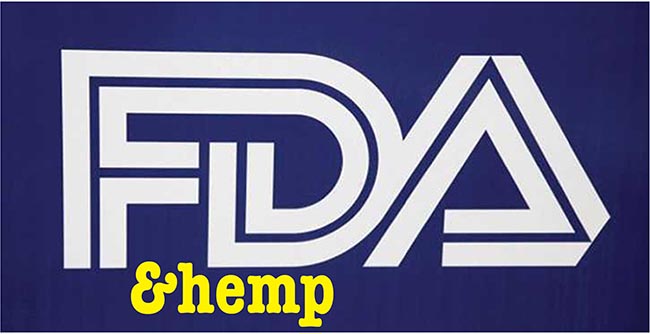The U.S. Food and Drug Administration (FDA) has asserted its authority to regulate products derived from cannabis, including hemp, and is therefore playing a major role in the development of markets for hemp derived food, cosmetics and drugs in the United States. This series explores the function and jurisdiction of the FDA in those sectors, how FDA decisions may affect the hemp business, and how stakeholders and consumers can participate in the process of getting products approved for public use.
By Sanford Stein | Second in a Series
With medical cannabis laws now in 33 of the 50 states, and recreational cannabis legal in 15 states, CBD must now be legal in the USA. Right?
Wrong. While it’s true the 2018 Farm Bill legalized industrial hemp, and that marijuana legislation continues to spread across U.S. states, government agencies are still grappling with rules for CBD.
With the Farm Bill’s removal of industrial hemp from Schedule 1 of the Controlled Substances Act (CSA), the jurisdiction of hemp moved from the Drug Enforcement Administration to the U.S. Department of Agriculture (USDA). But just like any other product sold in the United States, hemp-derived CBD also comes under the Food, Drug and Cosmetics Act (FD&C Act) which, through the U.S. Food and Drug Administration (FDA), authorizes products after testing them to ensure safety – a notoriously slow, if thorough, process.
The FD&C Act authorizes the FDA to run clinical trials on human foods, drugs, dietary supplements, food additives, cosmetics, animal foods and tobacco products. The FDA also has a say in labeling and dosing of drugs and food supplements.
The FDA has already acknowledged the benefits of cannabis use for seizure disorders with the approval of a single drug, Epidiolex, which has helped patients who suffer Dravet Syndrome and Lennox-Gastaut Syndrome, two debilitating forms of epilepsy. The product, which contains high levels of CBD (100 milligrams per milliliter), was the first cannabis-derived prescription drug to gain FDA approval.
But wider research is desperately needed. As CBD grows in popularity, the market expands, with often potentially dangerous results. CBD sellers have repeatedly been warned by the FDA about misleading health claims, mislabeling and adulterated products, a problem that is not unique to the USA.
What FDA’s thinking
FDA knows clear rules for CBD are needed, underpinned by the agency’s research and testing resources. That recognition was demonstrated recently when the agency hosted a day-long seminar that revealed some of its thinking about CBD and other cannabinoids.
Part I: Time for U.S. FDA to authorize early use of CBD products
Part III: Upcoming – Ideas for the Biden Administration on FDA research and authorization of hemp derived CBD in foods, beverages and medicine.
While the seminar focused on women’s health, presenters at the event, representing the FDA and several medical schools and private research institutes, acknowledged that there is a growing public interest in CBD and other cannabinoids, including THC and CBG. In addition to dialogues on the effect of those derivatives on women’s health, there was plenty of discussion about what the FDA is doing to approve CBD for pain management, anxiety, sleep disorders and other concerns.
Universally, the experts who addressed the seminar lamented a dearth of science based knowledge about the medical benefits of cannabis, noting the mainstream scientific community in the U.S. is still waiting for typical clinical trials to demonstrate the efficacy of CBD and other cannabinoids.
Research is priority
With the approval of Epidiolex, and spurred by market forces that leave CBD products uncontrolled, the FDA has already acknowledged the need to make such research a priority. The admission alone is a big step for the FDA and its team of scientists. They recognize that cannabis use has become common in the U.S. and legal within the boundaries of a clear majority of U.S. states, comprising approximately two-thirds of the U.S. population.
But the agency is in a catch-22. With most cannabis still illegal at the federal level under the Controlled Substances Act, research funding is limited to only hemp-derived substances.
Some of the speakers acknowledged this unfortunate dichotomy, and with veiled suggestions indicated that legal changes to the CSA might be in order; if for no other reason than to study cannabis in all of its forms and close the “significant science gap” that the agency suffers.
Others claimed that since the FDA is a “science led agency,” it should be the one to do the scientific research to close the “knowledge gaps between risks and benefits” of using CBD and other cannabinoids.
Other indicators
The FDA seminar, “CBD and Other Cannabinoids: Sex and Gender Differences in Use and Responses,” was organized by the agency’s Office of Women’s Health and featured FDA staff MDs, Ph. Ds and non-FDA academic and institutional research scientists. Other observations from the seminar indicate the current path for the FDA:
- Research is not only likely to find that CBD is not harmful, but also reveal many benefits that can be identified and warranted scientifically, and a few uses that should be avoided.
- Standards are needed to help inform the public about the use and benefits of CBD in proper concentrations and formulations; speakers expressed frustration that “without regulation there is a lot of junk out there.”Some speakers stressed that “prohibition laws inhibit research,” citing examples with alcohol prohibition in the 1920s and other prohibited substances since then, including cannabis. There was acknowledgment that “some legal substances (alcohol and cigarettes) are more harmful than many illegal substances.”
- Both FDA and non-FDA experts noted some potential harms from very large doses of CBD and some concerns on how its use might affect pregnancy and lactation, as well as, interestingly, male reproductive health.
- Existing studies tend to acknowledge anecdotally assumed benefits. Further studies should be encouraged to check anecdotal claims regarding pain management, anxiety, sleep disorders and other problems. Scientists urged basic research to understand proper use and dosing.
Positive steps
In summary, the scientists who spoke at the FDA seminar mostly support the use of CBD and other cannibinoids including THC for some conditions, mostly the ones that they’ve studied. It’s important to note that these scientists supported their conclusions with research.
This kind of support from the mainstream scientific community is a positive step for the industry despite the legal impediments holding them back from more robust scientific exploration of cannabis.
It is time for the FDA to fund more research and if they can’t do it because of arcane federal restrictions, then let’s change the law and/or allow the states and academic community to fund it. The FDA might also provide research grants to these institutions.
Let’s get the knowledge necessary to satisfy the FDA’s function in management of foods, beverages, dietary supplements and drugs. Only when we do that can we get the agency to approve the widespread use of CBD products.

American lawyer Sanford Stein is a leading authority in the regulated cannabis industry with emphasis in government regulations, legislation and business opportunities. He has legislative experience at every level of government, and has appeared as lead counsel before at the United States Supreme Court. He is the founder of Cannabis Law LLC.
Disclaimer: This article and its contents are not intended to be used as legal advice. Please consult with a lawyer before taking any actions with respect to any of the information contained in this article for any use or sale of hemp or hemp-derived products or compounds.

